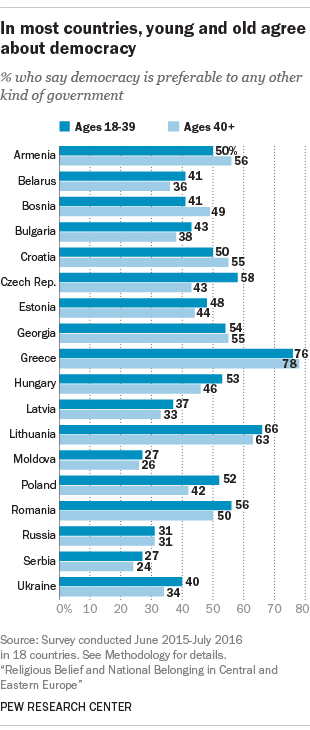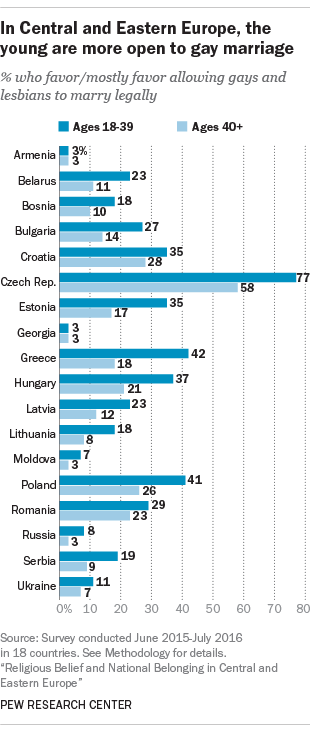 The generation of Central and Eastern Europeans who came of age after the fall of the Berlin Wall and collapse of the Soviet Union differs little in its political outlook from earlier generations weaned on communist ideology and anti-Western propaganda. Today, support for democracy is relatively tepid among both age groups. Majorities in most countries across the region are upbeat about free markets, with similar levels of support among young and old, according to a new Pew Research Center survey of adults in 18 Central and Eastern European countries.
The generation of Central and Eastern Europeans who came of age after the fall of the Berlin Wall and collapse of the Soviet Union differs little in its political outlook from earlier generations weaned on communist ideology and anti-Western propaganda. Today, support for democracy is relatively tepid among both age groups. Majorities in most countries across the region are upbeat about free markets, with similar levels of support among young and old, according to a new Pew Research Center survey of adults in 18 Central and Eastern European countries.
In only two of the countries polled – Czech Republic and Poland – are young people significantly more supportive of democracy than older adults. Throughout the region as a whole, a similar share of those under 40 and those 40 and older say democracy is preferable to other forms of government (medians of 49% and 44%, respectively). One especially notable example of this young-old alignment is Russia, where 31% of both groups say democracy is preferable to other forms of government.
The fall of the Iron Curtain also led to economic reform in Central and Eastern Europe. Here, again, there is substantial alignment between the views of younger and older people, with majorities in most countries embracing free markets.  A median of 59% of those 40 and older say people are better off in a market economy, compared with 64% of those under 40. Only in a handful of countries (for example, Croatia, Czech Republic, Russia and Ukraine) are younger people significantly more likely than older people to favor a market economy.
A median of 59% of those 40 and older say people are better off in a market economy, compared with 64% of those under 40. Only in a handful of countries (for example, Croatia, Czech Republic, Russia and Ukraine) are younger people significantly more likely than older people to favor a market economy.
Younger and older people do differ to some degree in their social attitudes. For example, those who came of age after the fall of the Berlin Wall are consistently less likely to say that divorce, drinking alcohol, sex before marriage and homosexual behavior are morally wrong.
But younger people still tend to have some socially conservative views. For instance, among those under age 40, a substantial share (a median of 63%) say homosexual behavior is immoral, though this is somewhat lower than the share of those 40 and older who share this view (a median of 76%).
Similarly, younger Central and Eastern Europeans are twice as likely as older adults to say they favor same-sex marriage (a regional median of 23% of those ages 18 to 39 favor same-sex marriage, compared with 12% of those 40 and older). But overall support is low among both groups.



